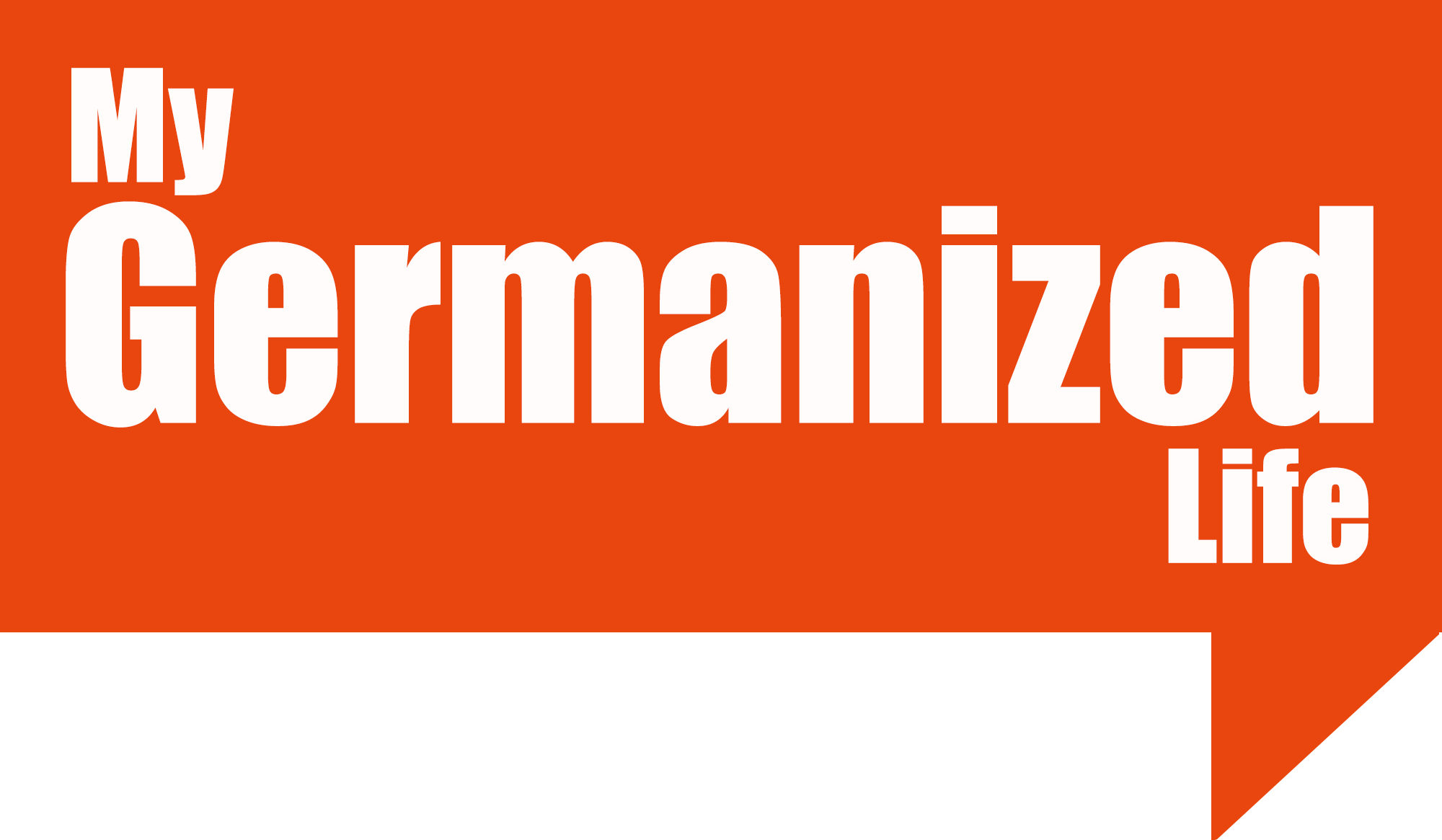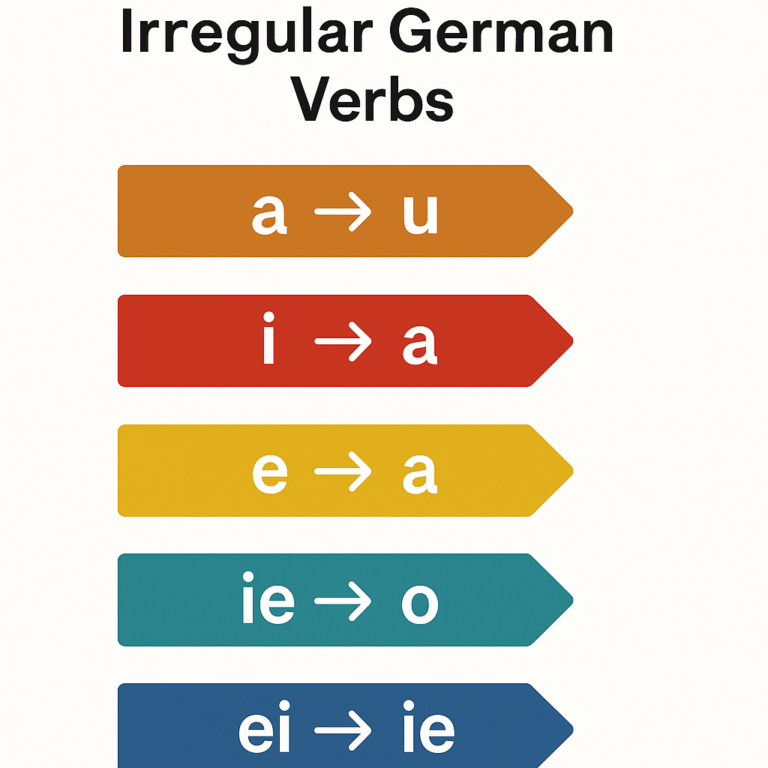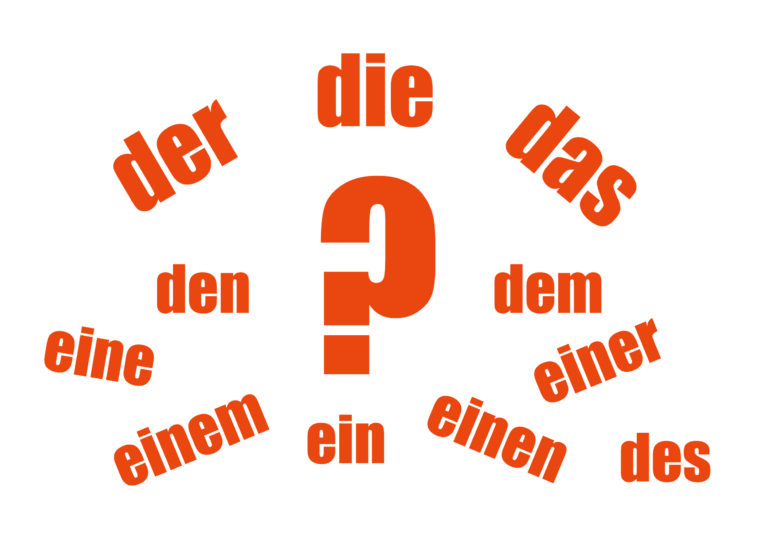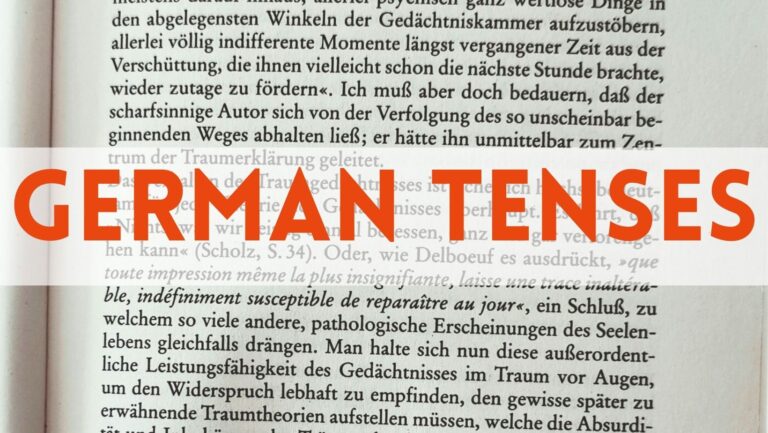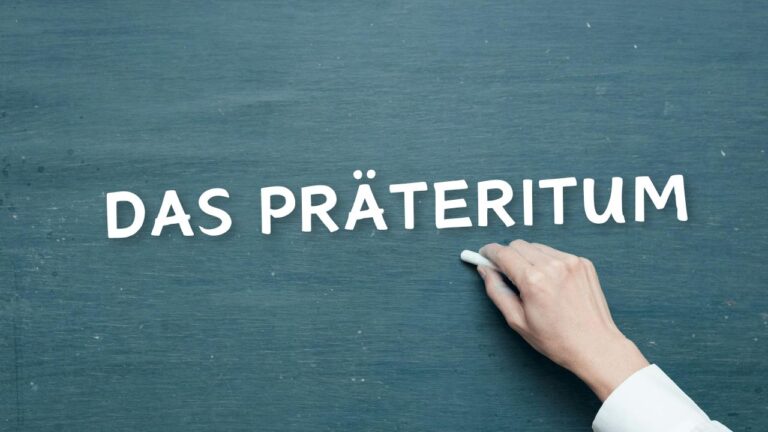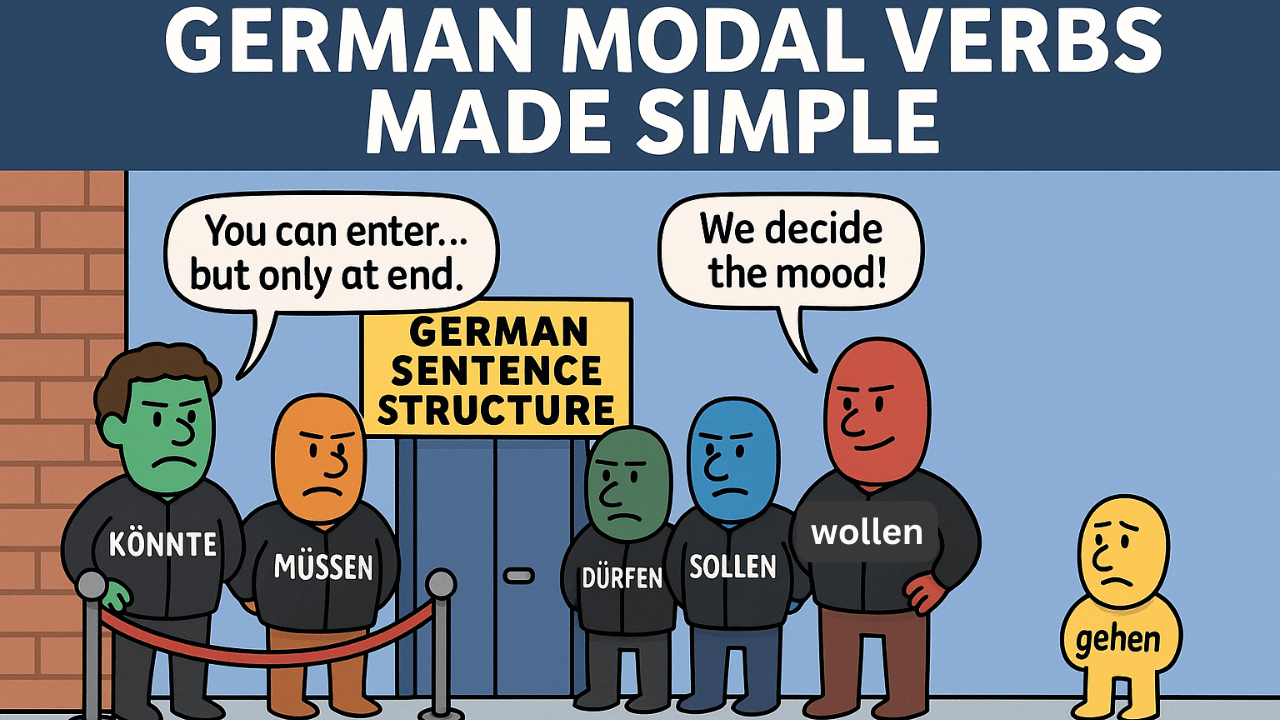
Modal verbs in German are small but mighty. They help you express concepts such as permission, ability, necessity, or desire. You’ll hear them in everyday conversations, and using them correctly will take your German to the next level.
In this guide, we’ll walk through what modal verbs are, how to structure sentences with them, and look at each modal verb with clear examples. Download your free German modal verbs reference cards in the PDF at the end of this article!
What Are German Modal Verbs?
Modal verbs (Modalverben) are helping verbs that modify the main verb in a sentence. Think of them as the “mood” setters. Instead of saying “I eat,” modal verbs let you say “I want to eat,” “I must eat,” or “I can eat.”
Here are the six most common modal verbs in German:
- dürfen – to be allowed to
- können – to be able to / can
- mögen – to like
- müssen – to have to / must
- sollen – to be supposed to / should
- wollen – to want to
There’s also möchten (would like), a polite form derived from mögen, often used in everyday conversation.
Sentence Structure with Modal Verbs
Modal verbs are conjugated in the present tense, and the main verb gets kicked to the end of the sentence in its infinitive form.
Example:
- Ich muss heute arbeiten.
(I have to work today.)
Structure:
Subject + conjugated modal verb + rest of the sentence + main verb (infinitive at the end)
It works the same way in questions and negations:
- Kannst du Deutsch sprechen?
(Can you speak German?) - Ich will nicht tanzen.
(I don’t want to dance.)
Note: Each table shows
- Pronoun (ich, du, etc.)
- Modal verb conjugated in the present, simple past, and present perfect tenses.
- In Perfekt, the auxiliary verb is always haben + infinitive of the modal and the main verb (double infinitive structure)
dürfen – to be allowed to
Use dürfen when talking about permission.
| Person | Present | Simple Past | Perfekt |
| ich | darf | durfte | ich habe … dürfen |
| du | darfst | durftest | du hast … dürfen |
| er/sie/es | darf | durfte | er hat … dürfen |
| wir | dürfen | durften | wir haben … dürfen |
| ihr | dürft | durftet | ihr habt … dürfen |
| sie/Sie | dürfen | durften | sie/Sie haben … dürfen |
Examples:
- Darf ich hier parken?
(Am I allowed to park here?) - Kinder dürfen keinen Alkohol trinken.
(Children aren’t allowed to drink alcohol.) - Du darfst das nicht machen!
(You’re not allowed to do that!)
können – to be able to / can
This one expresses ability or possibility.
| Person | Present | Simple Past | Perfekt |
| ich | kann | konnte | ich habe … können |
| du | kannst | konntest | du hast … können |
| er/sie/es | kann | konnte | er hat … können |
| wir | können | konnten | wir haben … können |
| ihr | könnt | konntet | ihr habt … können |
| sie/Sie | können | konnten | sie/Sie haben … können |
Examples:
- Ich kann sehr gut kochen.
(I can cook very well.) - Kannst du mir helfen?
(Can you help me?) - Wir können morgen gehen.
(We can go tomorrow.)
mögen – to like
mögen is a bit tricky, because it refers to liking things or people, not actions.
| Person | Present | Simple Past | Perfekt |
| ich | mag | mochte | ich habe … mögen |
| du | magst | mochtest | du hast … mögen |
| er/sie/es | mag | mochte | er hat … mögen |
| wir | mögen | mochten | wir haben … mögen |
| ihr | mögt | mochtet | ihr habt … mögen |
| sie/Sie | mögen | mochten | sie/Sie haben … mögen |
Examples:
- Ich mag Schokolade.
(I like chocolate.) - Sie mag Katzen mehr als Hunde.
(She likes cats more than dogs.)
Want to say you like doing something? Use gern with the verb instead:
- Ich koche gern. (I like cooking.)
möchten – would like
Technically a subjunctive form of mögen, but it’s basically its own polite verb.
| Person | Present (Konjunktiv II) |
| ich | möchte |
| du | möchtest |
| er/sie/es | möchte |
| wir/Sie/sie | möchten |
| ihr | möchtet |
Examples:
- Ich möchte einen Kaffee, bitte.
(I’d like a coffee, please.) - Möchtest du mitkommen?
(Would you like to come along?)
This one is super useful in restaurants and polite requests.
müssen – must / have to
Use müssen for obligations or necessities.
| Person | Present | Simple Past | Perfekt |
| ich | muss | musste | ich habe … müssen |
| du | musst | musstest | du hast … müssen |
| er/sie/es | muss | musste | er hat … müssen |
| wir | müssen | mussten | wir haben … müssen |
| ihr | müsst | musstet | ihr habt … müssen |
| sie/Sie | müssen | mussten | sie/Sie haben … müssen |
Examples:
- Ich muss morgen früh aufstehen.
(I have to get up early tomorrow.) - Du musst das Formular ausfüllen.
(You must fill out the form.) - Wir müssen noch einkaufen.
(We still have to go shopping.)
sollen – should / supposed to
sollen often expresses something you’re expected or advised to do.
| Person | Present | Simple Past | Perfekt |
| ich | soll | sollte | ich habe … sollen |
| du | sollst | solltest | du hast … sollen |
| er/sie/es | soll | sollte | er hat … sollen |
| wir | sollen | sollten | wir haben … sollen |
| ihr | sollt | solltet | ihr habt … sollen |
| sie/Sie | sollen | sollten | sie/Sie haben … sollen |
Examples:
- Ich soll mehr Wasser trinken.
(I’m supposed to drink more water.) - Was soll ich tun?
(What should I do?) - Du sollst deine Hausaufgaben machen.
(You should do your homework.)
wollen – to want to
Use wollen to express strong intention or desire.
| Person | Present | Simple Past | Perfekt |
| ich | will | wollte | ich habe … wollen |
| du | willst | wolltest | du hast … wollen |
| er/sie/es | will | wollte | er hat … wollen |
| wir | wollen | wollten | wir haben … wollen |
| ihr | wollt | wolltet | ihr habt … wollen |
| sie/Sie | wollen | wollten | sie/Sie haben … wollen |
Examples:
- Ich will ein Eis!
(I want ice cream!) - Wir wollen nach Berlin fahren.
(We want to go to Berlin.) - Willst du mitkommen?
(Do you want to come along?)
Just a heads-up: wollen can sound a bit demanding if you’re not careful with tone. In polite situations, möchten is your friend.
Download Your Free German Modal Verbs Reference Charts
Final Tips for Using Modal Verbs
- Modal verbs always come second in a statement.
- The main verb goes to the end in its infinitive form.
- In past tense, use haben + past participle of the modal or switch to an alternative phrasing.
Example (past):
- Ich habe nicht gehen können.
(I wasn’t able to go.)
